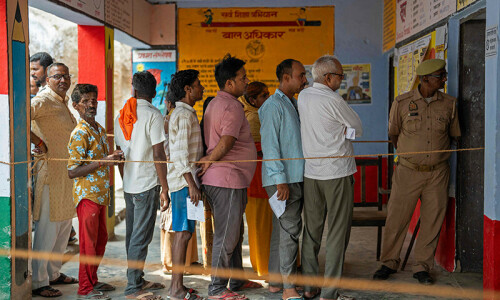KARACHI: The Department of Plant Protection (DPP), Ministry of National Food Security and Research (MNFSR), has banned the use of wood packaging including crates, boxes and cases, for storing fruits and vegetables intended for exports from May 20, 2015.
The decision has been taken considering phytosanitary measures since wood is a pathway to the introduction of pests.
DPP had received serious warnings from the European Union and other countries due to increasing interceptions of consignments infested with pests and deterioration in quality due to use of wooden packaging.
According to the circular, no official phytosanitary certificate shall be issued to any perishables (fruits and vegetables) intended for export in wood packing material as a phytosanitary measure under the guidelines of ISPM-15 to which Pakistan is a signatory in compliance to the procedures of International Plant Protection Convention 1951.
Co-Chairman All Pakistan Fruit and Vegetable Exporters Importers and Merchants Association (PFVA) Waheed Ahmed in a letter to the MNFSR on April 16, 2015 said the association is against the use of wood packaging currently in use.
“It is untreated wood and poor in presentation. Some countries still use wood but their packaging complies with international standards. The wood is treated, evenly coloured, well presented and sustainably sourced. If exporters use similar standard of wooden packing, the cost would far outweigh the cost of corrugated packaging,” the letter said.
By complying with international best practices, the quality and price of Pakistani mangoes and other produce would improve and additional markets can be tapped, the letter added.
It is worth noting that Dubai is a transit hub and once there, the exports are re-exported in better packaging to other Gulf countries including Bahrain, Iraq, Lebanon, etc as they do not accept wooden crates.
Due to this restriction, exporters are unable to enhance exports of perishable goods to these countries.
Even for domestic markets, fruits including grapes, apples, strawberry and cherries are packed in corrugated cartons so that during cold storage, development of fungus can be avoided.
Pakistan is the only major exporter of fruits in wooden packaging in unrefrigerated containers to the UAE and Muscat. Such practices are not allowed by International Standards and present a poor image of Pakistan.
The PFVA office bearer said that out of the total exports, around 50-60 per cent is exported to UAE and Muscat and of this only 25pc is shipped in wooden crates. Around 93pc of mango is consumed locally and only 7pc is exported. Of the share exported, only 25pc goes to the UAE and Muscat.
Waheed said using corrugated cartons would play a pivotal role in the enhancement of exports.
The role of the middleman would be limited and exporters would directly procure products from the growers. The profit margin of the middleman would be shared between exporters and growers.
Waheed said that supermarkets in Middle East are reluctant to showcase Pakistani mangoes due to unhygienic and unattractive packing.
They are demanding attractive packaging and also want compliance with international standards such as GLOBAL CARE, GOBAL GAP, HACCP, ISO. The wooden crates used in Pakistan do not qualify under any of those standards, he said.
The UAE government has already started initiatives to ban wooden packaging from unsustainable sources to stop deforestation and present a good image of the UAE.
Certification of wood treatment and sustainability certification will be a must in the near future, the PVFA letter said.
“Eventually international markets will not accept our current wooden packaging. If the UAE, Muscat and other Gulf countries impose ban on Pakistani agriculture products, this will give opportunity to other global countries to impose ban on our products as well,” it added.
The letter said that there are plenty of corrugated production units in Pakistan to cater for the demand and in the long run, a changeover would bring down the price of packaging.
Published in Dawn, April 18th, 2015
On a mobile phone? Get the Dawn Mobile App: Apple Store | Google Play











































